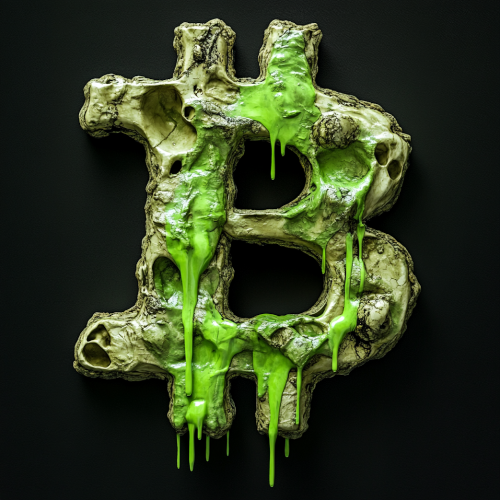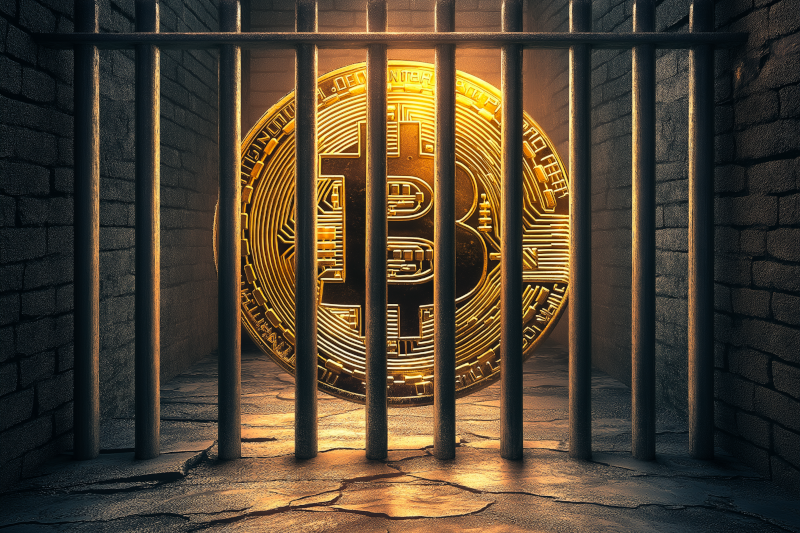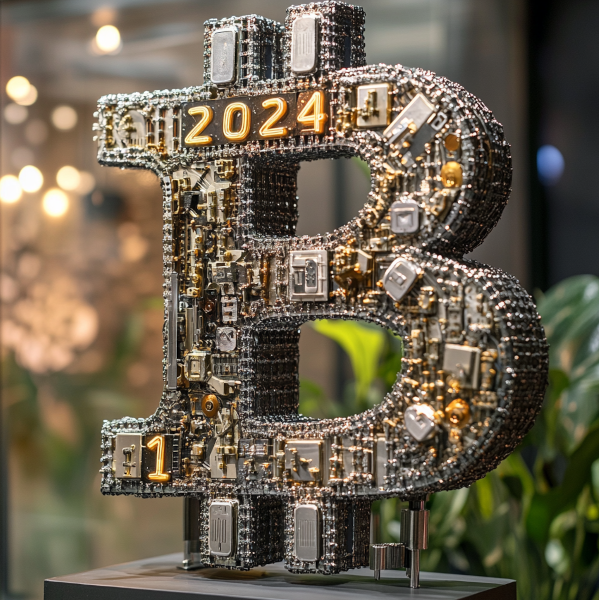A History of Bitcoin Maximalism

Note: if you'd prefer to consume this essay in audio format, you can listen to it here (narrated by Guy Swann of the Bitcoin Audible Podcast.)
Over the past decade the crypto asset ecosystem has exploded in size and complexity. While the overwhelming majority of projects are arguably scams or simply shitty ideas, one in a hundred does manage to innovate and find product market fit.
Bitcoin maximalism has evolved as a result, but it has also become more complex as schisms have appeared. Unfortunately, as I’ll explain throughout this post, some aspects of stereotypical “maximalist culture” as it is known, are detrimental to the cause of Bitcoin adoption.
The goals for this article are as follows:
- Provide a historical overview of impactful points for Bitcoin Maximalism’s journey
- Describe variants of maximalism and the pros and cons of toxic behavior
- Offer warnings and suggestions for going forward
This is an incredibly lengthy essay; very few readers will make it all the way through. If you really want to skip all the details, you can jump to the summary and conclusion.
The History of Toxic Maximalism
Genesis
Long ago, in the days before “Bitcoin Twitter” had even formed as a community, the Schelling point of Bitcoin discussion and culture was the BitcoinTalk forums. It was a simpler time. There were hundreds of new network launches that were regularly publicized by their creators with [ANN] posts on the altcoins board. Pretty much all of them were trivially modified copies of the Bitcoin codebase with changes that were mostly marketing and little substance. The very first use of the word “shitcoin” was in the context of scammers creating worthless knock-offs of Bitcoin:
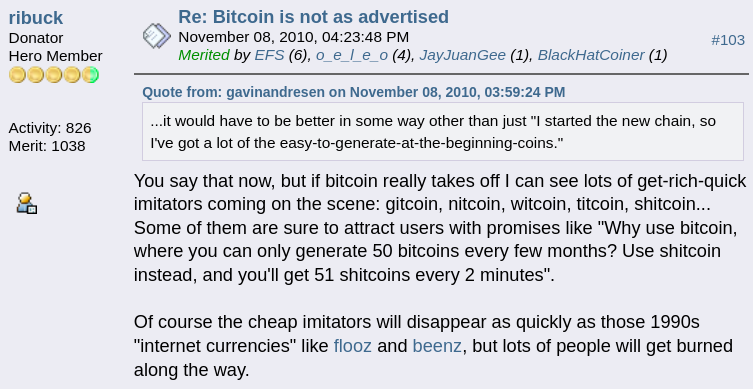
Altcoins were by and large low-effort pump-and-dumps, and a defensive culture formed as plenty of Bitcoiners got burned by scams and unfair crypto economics. We agreed that “premines” that allocated tokens to insiders were unethical and many thought that even if an altcoin managed to innovate and create value, that innovation would eventually be subsumed by Bitcoin - thus they could be dismissed as Bitcoin testnets. Altcoins spanned the gamut from scams to stupid endeavors - they were all shitcoins for one reason or another, and suitable neither as sound money nor as investments.
Maximalism certainly existed in those early days, though the term hadn’t been coined. Maximalist attitudes tended to be more of a firm “no thanks” when presented with worthless altcoin projects. Many of us found it offensive that some folks thought they’d be able to get rich quick from low effort Bitcoin knock-offs.
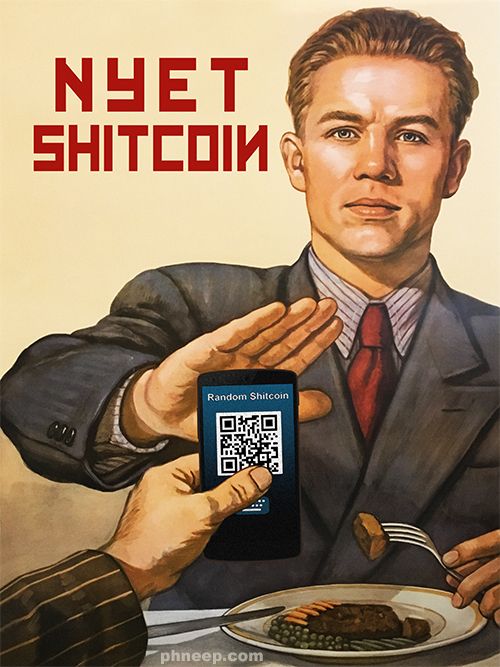
In the early post-Satoshi days of protocol development, when Gavin Andresen was the project maintainer, there really wasn’t much of an organized development team. Everyone who contributed to the codebase was a volunteer - there was no money to fund development. As such, Bitcoin needed a developer culture. One way of attracting and retaining contributor talent was to discourage people from joining other projects by portraying altcoins as useless scams (which they were.)
In those first few years the network was weak in a variety of ways, so there was a significant need to stave off the vampiric effects of altcoins. Without this narrative it’s possible that Bitcoin development would not have bootstrapped itself over the next few years, in which we saw significant elevation of the talent pool's depth of understanding of the protocol’s strengths and weaknesses.
By 2014 Bitcoin had a rather vibrant group of skilled contributors. The Sidechains Whitepaper was released and the future was bright; we finally had an answer for how to enable folks to innovate within the Bitcoin ecosystem while not risking harm to Bitcoin itself. In 2015 the Lightning Network whitepaper promised even further innovation in the area of low latency, high volume transactions that were also anchored to Bitcoin. Maximalists rejoiced; the world was our oyster and hyperbitcoinization was clearly underway.
Of course, just a few months later in 2015 we saw the launch of Ethereum, which was a completely new approach to crypto asset protocols. Thus began a major shift in the development of altcoins.
The Toxicity Begins
Mircea Popescu was a lead figure in the early development of toxic maximalism, before it was even a term. He was a prolific writer (ranter) who disseminated some ideas that have had a lasting impact. And at least a few of his followers from the cult of La Serenissima are still with us today, having attained influential positions on social networks…
The Mircea adherents, sometimes known as the #bitcoin-assets denizens (their hangout on IRC), formed a unique culture. In their eyes, if you didn’t have a GPG key on the WoT (Bitcoin-OTC web of trust) then you were an “unperson.” If you did jump through the hoops to join the WoT then you needed to engage in meaningful interactions and trades to get yourself recommended by other WoT users via positive reviews.
Popescu held court in this IRC room, and if you didn’t fit in with their culture, understand the lingo, and have a high tolerance for bigotry, misogyny, and racism then you wouldn’t have a very good time there. Mircea did not place much weight on the effectiveness of his communications; he’d post a rant in his bombastic hard-to-follow style and would not be particularly concerned with how it was interpreted. Take, for example, his anti-SegWit article in which he decided to “explain” his view by posting a bounty for a protocol developer’s assassination. While he did so to make an interesting point about verifiability, it’s lost on the vast majority of readers due to the shock value and lack of explanation.
The #bitcoin-assets crew were so adamant about rejecting changes to Bitcoin that they forked Bitcoin Core 0.5, created the “real” Bitcoin Foundation, and maintained their own full node implementation. Well, “maintained” is being generous.
Due to the high level of friction to join this group and their poor outreach efforts, it remained quite niche. Although Mircea himself failed to expand his reach beyond the one IRC room, (he was banned from Twitter for making a death threat against Andreas Antonopoulos) some of these behaviors were mimicked by the adherents onto other platforms…
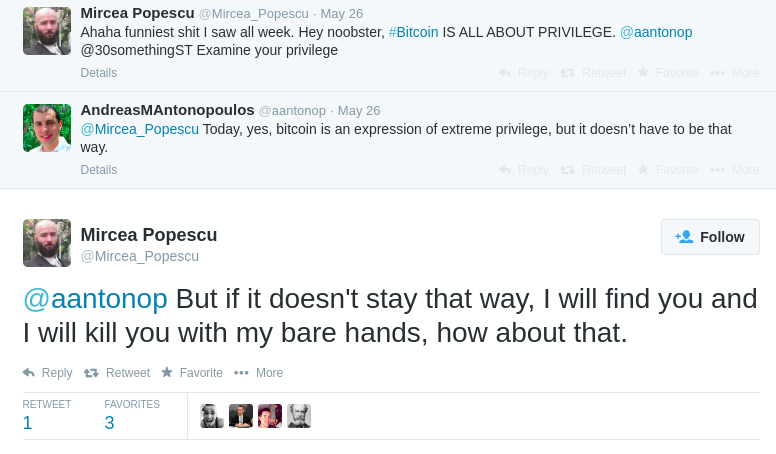
The Maximalism Moniker is Minted
The term “Bitcoin maximalism” was popularized in 2014 by Vitalik Buterin:
“One of the latest ideas that has come to recently achieve some prominence in parts of the Bitcoin community is the line of thinking that has been described by both myself and others as “Bitcoin dominance maximalism” or just “Bitcoin maximalism” for short - essentially, the idea that an environment of multiple competing cryptocurrencies is undesirable, that it is wrong to launch “yet another coin,” and that it is both righteous and inevitable that the Bitcoin currency comes to take a monopoly position in the cryptocurrency scene.”
While Buterin did not coin the term (it had already been in use, as you can see from an earlier blog post), he certainly played a role in positioning Ethereum and his perspective on crypto assets as a foil to Bitcoin and a dominant view (at the time) that altcoins are automatically immoral scams. Maximalism as a pejorative is clearly meant to evoke a certain closed-mindedness or lack of imagination in the Bitcoin community. One could even claim that maximalism is anti-free market.
Over the coming years as countless thousands of projects were launched, some maximalists updated their views to be more nuanced while still considering themselves maximalists, as Bitcoin was clearly a different beast from all other projects and had no real competition in the realm of sound money. Other maximalists became more extreme in their views that literally everything other than Bitcoin was a scam, and focused on shaping narratives to bolster those views.
The Scaling Wars
By 2015 we saw a mass migration from BitcoinTalk to the /r/bitcoin subreddit, where it had amassed over 150,000 subscribers. While BitcoinTalk did have admins, it was also a forum that was composed of many boards for different topics, so moderation was less common as long as you were posting in the appropriate topic area. Reddit, as a platform, is somewhat different. Due to how Reddit sequesters users into silos that each have their own rules and rulers (moderators,) along with how content visibility is modified by voting, I see Reddit as a platform that incentivizes groupthink and emotional responses over rational debate. The end result of this is that large subreddits inevitably become echo chambers; if you try to discuss a contrarian idea then you won’t see any engagement because your post will be downvoted to oblivion.
As there was more contention around how to move forward with scaling Bitcoin, the moderators of /r/bitcoin decided to ban discussion of hard fork proposals. This seems to be an inflection point at which “technical maximalism” (everything will be a Bitcoin sidechain) forced its view on the mainstream conversation. Why? Because the /r/bitcoin moderators were influenced by Theymos and immersed in the technical conversation on the development mailing list. Thus, they just brought its norms over to a wider body of folks following along on Reddit.
Naturally, the decision of /r/bitcoin mods to ban discussion of certain topics resulted in a great deal of backlash and it catalyzed a number of folks into migrating to the /r/btc subreddit. Now, 7 years later, the residents of /r/btc are still wailing over losing the scaling wars due to “censorship” - if you wish to dive down the rabbit hole of their grievances you can check out “A History of Censorship in /r/Bitcoin.” Personally, I find it to be a silly point to remain hung up on, given that Bitcoin scaling discussions took place on a wide variety of platforms that were not moderated by Bitcoiners, like Twitter. Point being: anyone who cared about the scaling debates was well informed of both sides’ positions.
During the scaling wars, Bitcoin Twitter coalesced into a substantial community with a lot of debate occurring on it. While this was undoubtedly a net positive for Bitcoin memetics, helping us reach millions of people and reinforce the principles of the system, there are plenty of reasons to believe that Twitter was a net negative for the quality of discourse. While Reddit’s mechanics and algorithms tend to squash controversy and create echo chambers, Twitter’s engagement mechanics are actually optimized to boost the reach and engagement of controversial posts. Add that to the fact that the content length of tweets is quite restricted and you get a recipe for rewarding edgy knee-jerk tweets that dunk on other tweets with a complete lack of nuance. While it can be a fun game to play, it is not conducive for healthy discussion of controversial topics.
Reclaiming the Pejorative
There’s a lengthy history of cultures reappropriating pejoratives. I think it certainly makes sense in the case of maximalism because we’re talking about ideological differences: the attributes of maximalism that many folks find objectionable are actually considered to be highly desirable by maximalists. I’d also argue that while maximalism is a way of navigating the crypto ecosystem, it’s also aspirational. Remember that Vitalik’s use of the word was for “dominance maximalism” - that the crypto ecosystem will be dominated by Bitcoin. While Bitcoin is unquestionably dominant even after 14 years, it’s not quite as dominant as many maximalists would like.
The use of the word "maximalist" really came back into play during the scaling wars and 2017 ICO hype cycle. It seems that the use of "toxic maximalism" as a descriptor really picked up mid-2018. For what it's worth, maximalists were later vindicated when it was shown that ~80% of ICOs were scams.
1/ "Intolerant" and "toxic" bitcoin maximalism? Understand what's going on beneath the surface with altcoins and their affinity scamming
— Stephan Livera (@stephanlivera) July 16, 2018
During the scaling debate we saw Samson Mow start producing hats as a new form of social signaling. The first hats were "Make Bitcoin Great Again" and "Make Ethereum Immutable" (poking fun at the DAO fork.)

Mow was a prolific hat producer with 10+ styles sold over the next few years; in late 2019 we saw Samson Mow create “Toxic Maximalist” hats as a result of the term being thrown around more frequently - it was a way of social signaling which tribe you were in: bitcoin-only or multi-coin.

I think it’s fair to suggest that the pejorative reclamation which happened around 2017 was a resurgence in Mircean toxic maximalism. This was a response, in part, due to the failure of technical maximalism’s promise that sidechains would result in an explosion of innovation linked to Bitcoin. Rather, we saw sidechains stagnate while Ethereum and other protocols saw a great deal of adoption and new functionality. Because the narrative of technical maximalism was fading in strength, folks needed a new narrative that didn't require sidechains to succeed. This is what the reverberations of Mircea offered in the form of the #bitcoin-assets folks adopting his style and forcing it into the conversation.
By reclaiming the pejorative, Bitcoiners use it as a social signaling mechanism. We see the same sort of signaling of maximalists saying that “Bitcoin is not crypto” which is technically incorrect at the surface level, but implies a far deeper meaning in the differences between Bitcoin and every other crypto asset protocol.
Pax Maxima
In 2018 and 2019 we saw the beginnings of what would become cornerstones of the next iteration of stereotypical Bitcoin maximalism. The Bitcoin Standard was published, countless new memes were crafted and entered into the vernacular (Bitcoin fixes this / number go up / etc), and carnivore dinners started being held.
The scaling wars died not with a bang, but with a multi-year grinding whimper. By 2020 it was quite clear that the plethora of big block bitcoin forks were not going to gain meaningful traction. A lot of the OGs who had been heavy participants in the scaling wars were weary and withdrew from public life. This left a void for newcomers to fill - but we needed some fresh enemies! It wasn’t long before the pandemic provided plenty of cannon fodder. There were plenty of authoritarians to decry and the money printers went into overdrive.
During pandemic lockdowns we saw an acceleration of “lifestyle maximalism” as several new facets of “maximalist culture” appeared or were reinforced, such as:
- Carnivory
- Laser eyes
- Anti-woke
- Weightlifting
- Tradwife culture
- Climate change denial
- Overt Christian moralizing
- “Have fun staying poor” retorts
- Rejection of seed oils and sunscreen
- Vaccine conspiracies, alt-health cure-alls
- Contrarianism for the sake of contrarianism
- Political populism and support of strongmen
- “Fiat” criticism of contemporary art and architecture
To be clear, I myself participated in some of the above! This is not a judgment on any of the topics mentioned.
The COVID-19 pandemic brought about a significant acceleration in the evolution of Bitcoin maximalist ideology, with a shift from traditional face-to-face events to new forms of media such as Clubhouse and even virtual reality. The disruption caused by the pandemic made it essential to explore alternative content distribution channels, and those who leveraged social media engagement were the primary beneficiaries. A wave of newcomers with a more limited understanding of Bitcoin were able to dominate the conversation in these new arenas where other Bitcoin enthusiasts were also seeking information and entertainment. Bitcoiners already had a head start navigating this new era of online-heavy interactions due to the borderless nature of our interest group. Early Bitcoin adopters already tended to be smart, contrarian thinkers who were happy to push the envelope with hot takes on covid-related authoritarianism.
The travel restrictions during the pandemic also played a significant role in directing attention towards the United States, where conferences continued, providing Americans with more platforms to expand their reach. This helped elevate the profile of Americans who were less affected by lockdowns, resulting in a post-2020 narrative that heavily leaned towards digital gold. This narrative was not new to Bitcoin (it has always been dominant) but it is logically more appealing to first world folks with access to modern financial infrastructure… and those subject to U.S. taxation.
I also observed an acceleration in the trend of “thought leaders” during this period. I saw educators and builders being drowned out by what appeared to be entertainers and performance artists. Folks who were skilled at “growth hacking” amassed huge audiences despite only offering shallow content. This was already happening before the pandemic, but now even moreso.
The problem was (and still is) that the lessons of the Scaling Wars were highly complex and not easily intuitive. They don’t make for great content if you’re hoping to increase your engagement and reach on social media networks.
What happened next?
- The new platforms were dominated by oral, second-hand storytelling. It was necessary that the ideas and learnings be "passed on," and so some of the old timers who were there began doing just that. They told "the great war stories" to the naive newbies, and the newbies learned.
- This next generation began participating in the oral storytelling, telling the traditions of the prior generation, without the same firsthand knowledge and thus without any nuance in their views. It was akin to a photocopy of a photocopy, with a lot of resolution lost.
- The economics of these platforms (Clubhouse, Spaces) were geared to lengthy soliloquies and thus their engagement mechanics only further incentivized this behavior.
This was how more mainstream Bitcoin culture degraded from intellectual expressions of ideas (2017-era debates) to tribal recreations of the past. The old enemies were replaced with new enemies who were more convenient for the times, but we retained the "Bitcoiners against the world" ethos of the scaling era, which led to many newbies being overly defensive of their beliefs. It’s worth noting that this is a recurring cycle (and of course, a general trope of “the good ol’ days”) because in 2017 people were saying how much better the discussions were in 2014, and in 2014, people missed the discussions of 2011. This is a naturally occurring phenomenon as communities go from niche interest to mainstream.
Antima Strikes Back
The extremism of the toxic maximalists made many of the more moderate maximalists uncomfortable. Outspoken maximalists who had amassed audiences had to decide: would they continue to talk about whatever they found interesting and accept abusive blowback, or would they self-censor and confine themselves to the Bitcoin echo chamber? From a cultural standpoint this was a bit unfortunate, and it certainly had a chilling effect as some public personas succumbed to audience capture.
Some nuanced maximalists pivoted to become provocateurs of the extremists, using their predictable behavior for engagement farming. These folks have come to be known as “anti-maximalists” (Antima) and they love to point out weaknesses / hypocrisy / abhorrent behavior displayed by the more extreme maximalists, triggering them by any means possible. These days that also includes trolling them by using Bitcoin in ways that upset those with more puritanical views.
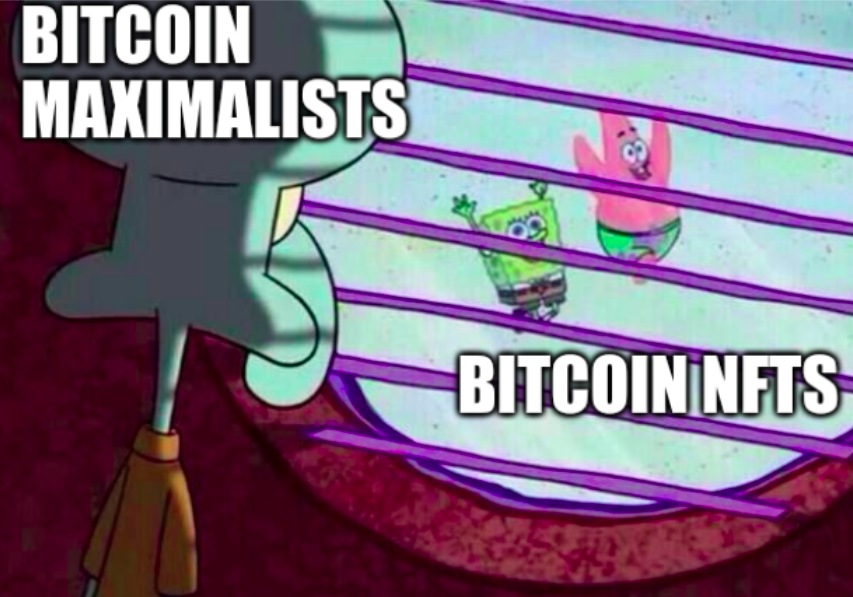
Multi-faceted Maximalism
We’ve reached the end of the history lesson; from this point on I’ll be covering my observations of present-day maximalism. What follows will be more subjective and controversial.
What is Maximalism?
What do Bitcoin maximalists believe? Pete Rizzo did a good job covering many of the principles that seem to be upheld as important aspects of Bitcoin Maximalism. I pose to you that there is no fixed set of beliefs that can be used to describe Bitcoin maximalism other than perhaps that Bitcoin is the best form of money and no other project can feasibly attain the same set of attributes. I think it’s safe to say that there’s a lowest common denominator of agreement that these inviolable properties of Bitcoin must be protected, but beyond that there’s a great deal of disagreement on what sort of behavior is appropriate when it comes to defending those properties. Personally, I see maximalism as a pragmatic decision that results from our scarcest resource: time.
Maximalism vs multicoinism is a tale as old as time.
— Jameson Lopp (@lopp) January 10, 2022
Do you spread your focus a mile wide and an inch deep?
Or do you go a mile deep at an inch width?
I've come to see modern maximalism as being shaped by 3 major components:
- The Immaculate Conception - Bitcoin has unique properties (leaderless, fair supply distribution) that cannot be recreated.
- Ethics of Money Production - Bitcoin is the only ethical money among all crypto assets because of the first point, thus other assets should be rejected as monies.
- A culture of protecting minority rights / individual sovereignty. Because of the software rule set you can call any compatible software bitcoin and cannot be infringed by the majority. Pete Rizzo dives into the concept in this article.
Pretty much all variants of maximalism spring from a foundation of the above principles. And yet no one gets to define the ideological constraints for what is required to be a Bitcoin maximalist. As such, due to the growth in adoption, increase in diversity of the user base, and the fact that everyone views Bitcoin from their own perspective of which attributes are most valuable, we now find ourselves in a situation of heterogeneity.
Giacomo Zucco presented his analysis of Bitcoin Maximalism several years ago, from the perspective of a self-described toxic maximalist. This is tongue-in-cheek and yet still holds true for many of the more extreme maximalists.
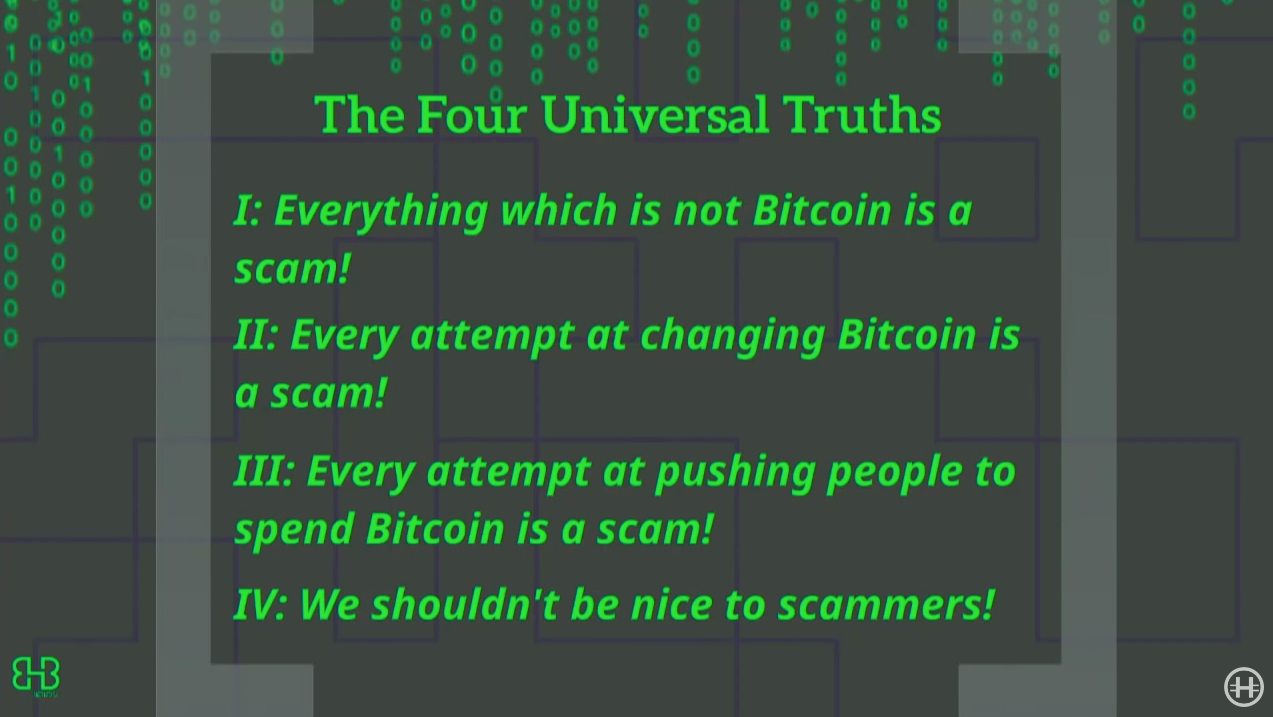
There is no doubt a disconnect between maximalists and non-maximalists on the approach and merits of maximalism.
| How Outsiders View It | How Maximalists View It |
|---|---|
| Emotional | Rational |
| Dogmatic | Empirical |
| Toxic | Healthy |
| Rude | Educational |
| Pessimistic | Optimistic |
Though, as this essay will attempt to convey, there are many maximalists who see the “toxic” set of maximalists from the same lens that outsiders view maximalism in general.
Simple Non-Toxic Maximalism is Sensible
Here Neil Woodfine presents a sensible take on the adversarial nature of Bitcoin and how the culture associated with maximalism can be unfriendly.
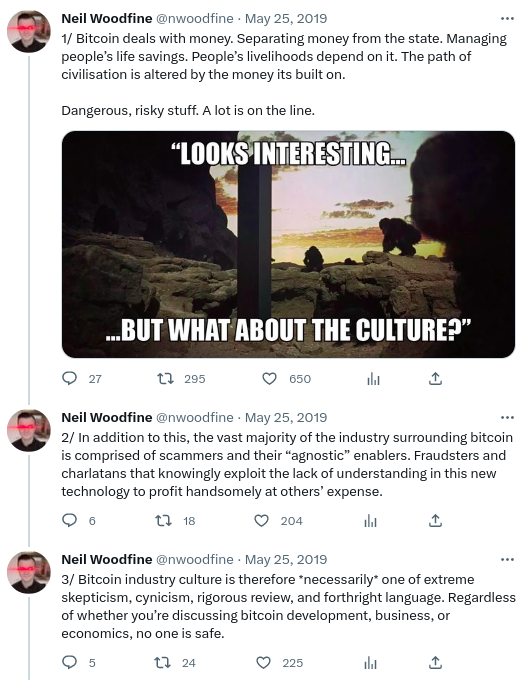
The crypto asset market is as close to a free market as you’ll ever find. Which means that it is a caveat emptor (buyer beware) market - you can not rely upon any authority to save you from scams. And boy, are there a ton of scams!
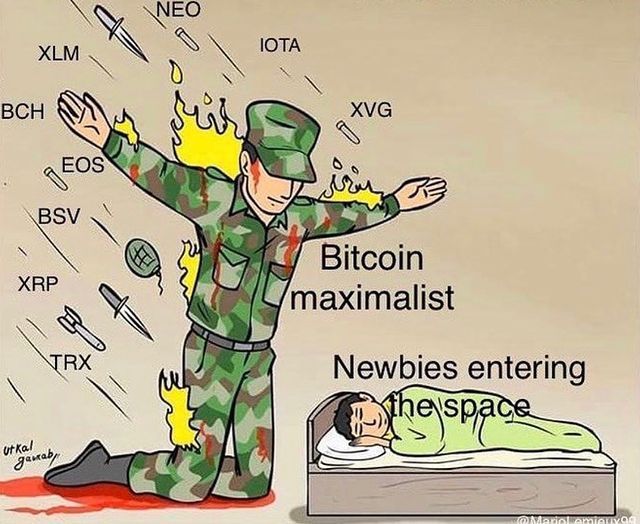
Sticking to Bitcoin makes sense in accordance with the KISS (keep it simple, stupid) principle. Bitcoin is one of the few projects of which there’s strong consensus that it’s not a scam. There are a variety of reasons for which one can make this claim, but Bitcoin's culture is unique in its focus on careful analysis and community skepticism of changes. The Bitcoin community is by far the only crypto asset community that second-guesses every consensus change, mostly due to the scars left from the block size wars. But that makes it unique - it is money without masters. Many other projects, even if they can’t be proven to be malicious scams, may be scams in the sense that the proponents are fooling themselves. And few projects in the crypto space are actually leaderless, thus making their potential for scamming far higher.
Bitcoin is (relatively) safe in the context of the risks inherent to other crypto projects. Investing in other tokens is akin to angel investing or penny stock investing. It requires a level of diligence that few folks are willing or able to dedicate. Those who buy such tokens are doing so without any of the legal protections afforded to equity investors, which compounds the risk for those choosing these investments.
Bitcoin maximalism and its culture of self custody and not trusting third parties is a safe refuge for unsophisticated retail investors.
It’s arguable that Bitcoin will be our one shot at launching a fair monetary system that is not controlled by anyone, thus we should be conservative about both the code and the culture. Ultimately, while Bitcoin has many layers of protection such as miners and fully validating nodes, the foundation rests upon a social layer of consensus amongst the humans who are devoting their time and resources to building and maintaining the network.
Maximalism does play a role in keeping Bitcoin’s culture robust. Specifically, it’s best that anyone who would want to tinker with an inviolable property such as the supply schedule doesn’t even bother to propose it in the first place. Toxic maximalists repel those people quite well. Ultimately, over the course of generations, Bitcoin's code will reflect our collective ethos, thus it’s logical to create an effective self-selection mechanism against the sort of culture drift that might one day threaten the sanctity of Bitcoin’s monetary policy.
Maximalist Morality
Many maximalists believe that investing in other cryptocurrencies is stupid, immoral, or uninteresting and should be discouraged and ignored socially for the benefit of others as a form of consumer protection. This goes back to the earliest days of altcoins and the fact that few investors are sufficiently sophisticated to sift through the mountains of trash to find the gems. There’s no shortage of examples from 2017 onward of projects with massive advertising budgets preying upon the unsuspecting retail market. One of the biggest scams that collapsed in 2022 ran ads all over the place, even at the Superbowl!

While consumer protection is an admirable goal, it's far from clear just how effective these moral teachings have been. Few newcomers look to Bitcoin maximalists before deciding on an NFT purchase or token pre-sale. From what I’ve seen, a ton of folks only become Bitcoin maximalists after learning a lesson the hard way and getting burned on an overhyped “investment.”
While many maximalists generally agree with regard to non Bitcoin projects (most are stupid or scams) there is some interesting internal conflict over the proper use of Bitcoin itself. That is to say, which use cases are an acceptable use of blockchain space and which are “spam.”
There are two conflicting perspectives for how to approach this issue: one of which is pretty widely shared among the crypto groups, and the other which seems confined to the domain of some Bitcoin maximalists.
- Economics is the sole judge of what constitutes spam. Transaction fees ensure the propagation of the chain in perpetuity, therefore any paid use of the chain is "good."
- Accessibility is what matters most. Bitcoin users ensure the propagation of the chain in perpetuity, thus anything that makes Bitcoin more expensive to use, or benefits one group at the expense of the collective (aka miners) is immoral. A moral Bitcoiner should strive to use the blockchain as little as possible to keep fee pressure low and fight the tragedy of the commons.
As I explained in a 2016 CoinDesk Op-Ed, Bitcoin is not merely money. It is a new type of database with radical integrity and robustness assurances that can be used to improve the trustworthiness of other systems that anchor into it. This perspective also seems to grind the gears of some maximalists who believe that Bitcoin should only be money.
This conflict around the “correct” way to use Bitcoin has arisen numerous times over the years, often in the form of debates around whether or not a certain use case should be considered “spam.”
- Satoshidice
- OP_RETURN wars
- Micropayments / dust transactions
- Inscriptions
This leads us to...
NIMBYism (Not in My Blockchain, Y’all!)
With recent debates and backlash over folks using Bitcoin for NFTs, I think it’s important to note that, after many years of Ethereum being the primary factory for shitcoin tokens, we should expect to see a renaissance of token issuance on Bitcoin and Lightning via technologies like RGB and Taro. This could very well become one of the next major points of contention between different variants of maximalists.
I believe this was caused by the “ethics of money production” pillar of maximalism mentioned previously. The flaw in this principle is that it doesn’t perfectly map onto Bitcoin, because at a technical level Bitcoin is a database that can be used for many monies / tokens. The money production ethical argument explains why we should want to build on Bitcoin over alternatives but it limits attempts to unlock Bitcoin's potential as a broader economy.
NIMBYism results in an odd schism and potential hypocrisy: on one hand, many maximalists decry the use of other protocols because folks “should be building on Bitcoin” while on the other hand, many of the same maximalists decry folks who are building on Bitcoin for “doing it wrong.” Trying to impose your subjective morality upon the use of permissionless protocols is a non-starter; you might as well piss into the wind or yell at clouds.
As a technologist I believe Bitcoin is only limited by human ingenuity. A longstanding maximalist view on altcoins was that anything other cryptocurrencies can do can also be achieved on Bitcoin, a Bitcoin layer, or a centralized alternative that is effectively the same. Though in recent years, prevailing narratives have trended toward “Bitcoin shouldn’t do ____” rather than “we could do ____ on Bitcoin.” Thus this group is now actively limiting the advancement of the Bitcoin economy in line with their ideology; they will claim that they do so in order to keep Bitcoin safe from unforeseeable side effects of changes.
Bitcoiners who obsess over stopping other people from using Bitcoin in a way they dont like are the attack, not the idiots doing stupid things.
— Bitcoin Isn't About You (@brian_trollz) March 9, 2023
You are wasting mindshare, developer time, and focusing everyone's attention on that instead of improving Bitcoin.
Toxic Maximalist Monoculture
For the vast majority of Bitcoin users there’s no lifestyle or culture associated with owning this asset; to them it’s just another asset in their portfolio. Perhaps, one could argue, those Bitcoiners are not as “important” to the future of the network because they are not contributing much. But there’s a subset of people who have made Bitcoin their entire personality and become emotionally invested in it, spending large swaths of their lives focused on evangelizing it… and more controversially, shaming those who don’t hold the same views. This stereotypical toxic Bitcoin maximalism has become an ideological monoculture; these folks both embrace and perpetuate the stereotype, much to the chagrin of the more moderate (or apathetic) majority.
When this particular subset of Bitcoiners are confronted with opinions that challenge their beliefs, they respond with hostility, sometimes even “swarming” like “cyberhornets” upon their chosen target. Extreme maximalists view all assets (both traditional and crypto,) apart from Bitcoin, as scams and doomed to fail, despite objective metrics that at least some of the other projects are thriving. Additionally, they believe that anything built outside of Bitcoin will ultimately be built upon Bitcoin, despite the lack of evidence of that occurring. As a result, they consider any investment made outside of Bitcoin as a mistake, grift, or scam.
This is a culture of purity and social signaling, which can feel exclusionary. The problem with purity tests is that there’s no end to them… the folks who apply ever-more restrictive purity tests are buffoons who spiral down a never-ending path of trying to out-virtue-signal their peers. One of the best examples pointing out the absurdity of the purity tests can be found in the post “Everyone’s a Shitcoiner.”
"If you've spent a reasonable amount of time on the cesspool of misery that is Twitter, and its slightly more tolerable sub-sect of Bitcoin Twitter, one thing ought to be clear by now: there is no true Bitcoiner. Oh, don't @ me, snowflake. Yes, yes, I've heard it all before. You read The Sovereign Individual twice before your 25th birthday. You can recite Bitcoin is Time backwards in your sleep in iambic pentameter. You only eat one meal a day consisting of grass-fed beef liver. You've made the top 50 list for events published on Nostr. You sun your balls. I get it, you tried your best to check all the maxi boxes. But you didn't. Why? Because you're not a true bitcoiner, that's why. You can think you're doing everything right, and pass every single purity test that comes your way, but you will eventually find that one purity test that you fail. And that makes you, dear reader, not a true bitcoiner. Not just you, but all of us. Not only are bitcoin maximalists not true bitcoiners, they're actually shitcoiners."
Ultimately, the only pure bitcoiner will be a ridiculous caricature, as one by one they attempt to "cancel" those who deviate.
— Andreas (aantonop) (@aantonop) August 26, 2020
This rigid ideology is self-mocking with delicious irony: "political correctness run amok" and identity politics by those who claim to hate both.
There’s a particularly thorny issue underneath all the talk of Bitcoin maximalism, which is that it can be quite difficult to tell if a given maximalist is logical or emotional, scientific or dogmatic, if you can’t engage in long-form conversation with them. And engaging in long-form discussions of first principles is not particularly conducive on popular social media platforms.
Maximalism is Actually Heterogeneous
Unlike traditional meatspace cultures, there are no geographical boundaries that contain Bitcoiners and serve to guide its culture. Unlike traditional cultures, in Bitcoin nobody knows your identifying attributes unless you choose to disclose them.Bitcoin culture is heterogeneous, despite any stereotypes that have arisen due to a small but potent group of folks who are active on social media. Loud and aggressive Bitcoiners on Twitter are not representative of "Bitcoin culture." Not even Bitcoin Twitter as a whole can be representative of Bitcoin culture. At time of writing, Hive has indexed 22,000 accounts belonging to the "Bitcoin Twitter" community. This is barely a drop in the bucket in comparison to the estimated millions of bitcoin owners. Most Bitcoiners don't care about it enough to spend much time talking to others about it, much less to make it a part of their persona.
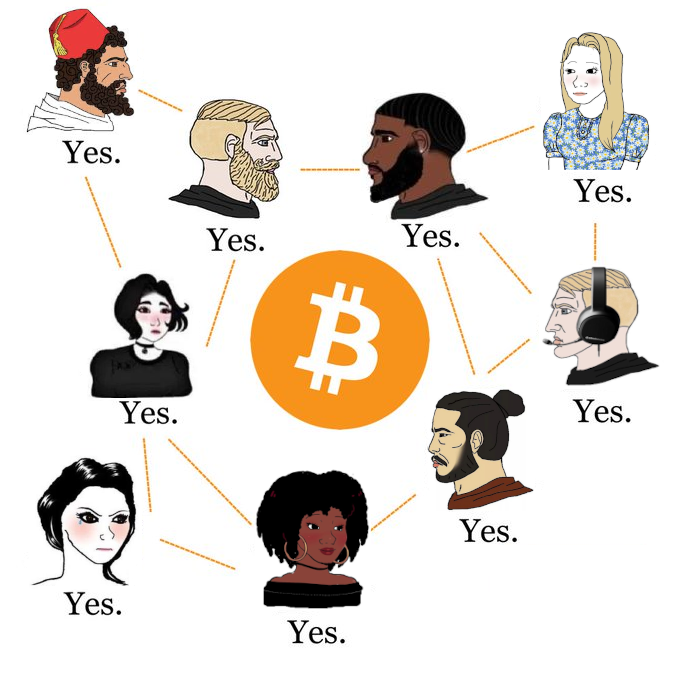
Some Bitcoiners choose to follow a whitepaper based orthodoxy. But, just as with any organized religion based upon a written text, it can be interpreted in a variety of ways and has known flaws.
Fundamentalists should note the following things are NOT described in the Bitcoin whitepaper:
— Jameson Lopp (@lopp) October 31, 2022
script
ASICs
multisig
addresses
mining pools
21M coin cap
8 decimal precision
HD address derivation
2016 block difficulty retarget
best chain != "longest" chain
and much, much more...
Some Bitcoiners believe it is divine and pure due to its “immaculate conception” and mythological founder who sacrificed immense wealth. They love to quote Satoshi, even out of context, if it furthers their desired narrative. Others consider Satoshi to largely be an irrelevant curiosity at this point.
Bitcoin has no official leaders. But some folks choose to take on cheerleader positions and may gain followings of like-minded Bitcoiners who agree with their perspectives on orthodoxy and morality. Some folks look at Bitcoin and see it as a cult. And it certainly does have some cult-like attributes… but if we’re comparing the sociology of Bitcoin to a religion, I’d consider it to be less like Catholicism and more like Protestantism or even Islam. Why? Because there is no structural hierarchy like you have with the Roman Catholic Church. Rather, there are independent scholars who amass followings based upon their teachings and interpretations.
The "Cult of Bitcoin" is a paradox. It involves the veneration of ideals antithetical to cults like self sovereignty & rejection of authority. https://t.co/vey1fBEkZ6
— Jameson Lopp (@lopp) December 29, 2020
Some maximalists are puritans who hate seeing block space used for anything other than to transfer bitcoin from one address to another. Others are more than happy to pay for block space that stores arbitrary data.
Some Bitcoiners believe that memetic warfare must be waged against any and all non-Bitcoin protocols because they are, in some way, competing with Bitcoin for network effects. Others are confident that Bitcoin is already destined to win because all competing networks are weaker / flawed in comparison, thus fighting frail opponents is a waste of resources.
Bitcoin maximalism no longer necessarily means bitcoin-only, as there is a great deal of functionality that Bitcoin does not offer. Going even deeper than that, while OG maximalism rested on the premise that eventually Bitcoin would eventually offer any and all functionality, we have yet to see the explosive growth of innovation via Bitcoin anchored systems. And today, some maximalists have even gone so far as to reject anything they consider to be non-monetary functionality in Bitcoin.
Any of the above may be more passive or more aggressive in sharing their beliefs.
Against Toxic Maximalism
By now we’ve established that maximalism is a rather complex topic. This should come as no surprise - humans are complex, social creatures. While this is an incredibly murky ethical gray area, I will attempt to draw some rough lines with regard to what behavior I find to be sensible vs behavior I find questionable.
Defensive vs Offensive Maximalism
It's perfectly acceptable to defend Bitcoin, especially when you come across folks who are lying about the properties of Bitcoin or the properties of their own project for their personal gain. But there's little use attacking folks for being interested in other projects. Being a Bitcoiner and being interested in other things are not mutually exclusive.
In many cases, “toxic maximalist” behavior is justified, as it is due to taking a principled stance against someone who is threatening or whining about Bitcoin. I find it quite appropriate for the “cyber hornet swarm” to react defensively against FUDsters or authoritarians who would love to see Bitcoin fail. Maximalists wish for nocoiners and altcoiners to stop attacking Bitcoin as part of their marketing efforts.
Bitcoin has no centralized foundation with a marketing budget like many altcoins. There’s no shortage of altcoiners who are incentivized to spread FUD about Bitcoin in order to make their protocol appear superior. In some cases, people associated with altcoins will explicitly sponsor attacks on Bitcoin. For example, the executive chairman of Ripple openly sponsored a $5 million attack on Bitcoin’s proof-of-work security. Alternatively, some Ethereum proponents designed an “ultrasound money” narrative that ETH’s monetary properties were superior because it’s now (sometimes) more deflationary than BTC.
Hey @greenpeaceusa,
— Jameson Lopp (@lopp) March 24, 2023
My offer to help you navigate the BIP process still stands.https://t.co/OxxDvfIwcE pic.twitter.com/b58Hu67lEg
Defending against such narratives is perfectly acceptable. If altcoiners did not attack Bitcoin, and did not attempt to “ride the coattails” of Bitcoin by conflating things as all being part of the same “crypto industry," there’d be far less conflict.
But from my perspective, a line gets crossed when Bitcoiners butt into other folks' lives to chastise them from a position of moral superiority. Toxic Bitcoiners are those who act like “it’s not good enough for Bitcoin to win, everyone else has to fail.”
The following is an excerpt from one of many toxic maximalist chat rooms. I’m not saying it’s representative of all toxic maximalists, but I certainly have noticed a pattern. Many of them tend to cycle through Twitter accounts on a regular basis due to being permanently banned as a result of the content they post.

Remember who used to enjoy making death threats? Mircea Popescu! There’s nothing amusing about threats; we should really be condemning any abuse that rises to this level. While some will claim that this is a problem specific to Bitcoin, it’s a simple fact that every community that grows to sufficient size will have some hateful, vitriolic folks. There's certainly a segment of Bitcoin proponents who seem to love hating non-Bitcoin projects more than they love promoting Bitcoin. It’s a shame that these folks don’t seem to realize that they have become that which they hate: Buttcoiners.
Toxic Maximalists Veer Near Buttcoinery
Crypto critics: "100% of the industry is scams that create no value!"
— Jameson Lopp (@lopp) June 6, 2022
Bitcoin Maximalists: "99.9% of the industry is scams that create no value!"
So close, yet so far...
I’ve enjoyed observing Buttcoiners and crypto critics over the past decade as they spend an inordinate amount of their time making fun of the antics in this industry, all the while watching it grow in value by orders of magnitude while denying that there’s any true value behind what is being built. Unfortunately, over the years I’ve seen more commonalities emerge between the nocoiner critics and certain flavors of maximalists.
Toxic maximalists are individuals who strongly believe that only Bitcoin will be successful as a cryptocurrency, often referring to all other coins as "shitcoins." They tend to belittle and insult anyone who expresses even the slightest interest in any altcoin, labeling them as "shitcoiners."
However, is it really possible that no other technology besides Bitcoin will have any value? Are smart contracts, DeFi, and NFTs completely worthless? This narrow-minded and insecure mentality is akin to a cult, as it fails to acknowledge the ecosystem of crypto assets that is objectively providing utility today. It’s also amusing to see the historical ignorance of folks who don’t seem to realize that NFTs and DEXs were OG Bitcoin ideas. It wasn't until the latest generation of puritans arrived that some decided these were sinful. How did this happen? I’m sure there are plenty of reasons, but if I were to speculate on the most common:
- Folks who dabbled in NFTs and DEXs got burned and now reject them outright.
- Since the development of these things wasn’t happening on Bitcoin and doesn't appear to be happening on Bitcoin, it’s easier to decry them as being worthless than it is to try to build competing functionality.
Toxic maximalists don’t seem to understand that it’s possible to want to see multiple projects succeed, including Bitcoin. It can be frustrating to see such closed-minded and cult-like behavior within the community. While it could be argued that “money” is a zero-sum game, it’s not controversial to claim that technology and wealth are certainly NOT zero-sum games. As such, I believe that multiple crypto asset networks will exist and serve different use cases. Of course, the value will be concentrated in the largest few due to network effects and the fact that no one wants to have to manage dozens of different tokens.
Bitcoin maximalism explained in one sentence:
— Jameson Lopp (@lopp) March 26, 2021
👏NOBODY👏WANTS👏TO👏MANAGE👏DOZENS👏OF👏DIFFERENT👏TYPES👏OF👏MONEY👏
Non-Bitcoin protocols are here to stay, and (some) other blockchains offer unique and valuable features. The market has already shown this, as billions of dollars are stored and transferred via other crypto asset protocols. People voluntarily pay fees to use these other blockchains, in some cases generating significant revenue for miners and stakers on these networks. Maximalists who deny this are ignoring the reality of the free market. Spare us your wishful thinking that all non-Bitcoin projects will collapse!

On one hand, if you deplore regulatory authorities then you should find it important to call out scams - this is how one supports self regulation. On the other hand, if you call out everything you don’t like as a scam, you’ll suffer from the “boy who cried wolf” problem and most folks will consider you a fear monger who creates more noise than signal.
A Theory On Modern Toxic Maximalism
There are plenty of rational reasons to be a maximalist. But I suspect many of the “latest generation” maximalists did not arrive at their conclusions by following the same path as the OGs. Many may, in fact, have short circuited the rationale and have been spoonfed the memes / narratives / idioms without digesting the substance from which they sprang.
When BitcoinTalk was the Schelling point for discourse, contributors rose in reputation over time based on the quality and thoughtfulness of their posts. The longer form of those platforms rewarded extended dialogue and debate.
Once the pandemic hit, some folks shifted to focusing on social media engagement as a way to wield influence. Twitter’s engagement mechanics reward dunking and general dickishness, which was noticed by plenty of personalities in the space, who became more and more provocative in their content, in an attempt to be more visible and shout louder than bad actors who would otherwise dominate the narrative for newcomers.
I believe that this resulted in otherwise rational and intelligent people pandering towards algorithms that encourage behaviors and communication styles that are actually rather high time preference. That is to say: prioritizing knee-jerk reactions and engagement over tribalistic matters while avoiding the more boring and complex topics that require nuance. I do consider this shift to be a net negative for the quality of Bitcoin discussion. While those who have engaged in these tactics have succeeded in attracting a large audience, the collateral damage that has been done to the culture of the economic majority of bitcoin has gone largely undiscussed. If this theory is correct, this is detrimental because the latest crop of maximalists is unable to logically defend their beliefs and thus they are more likely to resort to fallacies, dragging down quality of discussion even further.
This would support the Mimetic Theory concept Rigel Walshe mentions in this presentation. In short, we have distilled many of Bitcoin’s key principles into punchy one-liner memes. This is good for Bitcoin because it allows the propagation of the underlying principles to occur much faster and easier than if folks had to read lengthy essays about them. The irony that the length of this essay will limit its dissemination does not escape me. An unfortunate result is that while the memes make mainstreaming easier, it also necessarily means that folks’ understanding of the fundamentals behind why those properties are important is going to get diffused and, eventually, lost / not understood by the mainstream adopters.
What happens when you have a new wave of adopters arrive and a bunch of them who only have a surface level of understanding want to cheerlead further adoption? They copy what they see other “leaders” in the space doing, and try to outcompete them by being more extreme. This ramps up tribalism and toxicity. And thus, instead of the conflicts focusing on intellectual philosophical or technical discussions, we devolve into the Internet of Beefs in which the conflict becomes about the culture itself.
If we mainly talk in memes, what we lose is nuance. And a lot of the problems we’re experiencing with toxic behavior are due to a rejection of nuance - toxic folks tend to frame everything as being either black or white, either you’re with me or you’re against me.
One side effect of a world that lacks nuance and is mostly composed of social signaling is that it makes it a lot easier for sociopaths to infiltrate the group, put out the right social signals, and then trick folks into following them into some sort of scam.

Toward a Healthier Culture
If a little toxicity can be a good thing, how can we possibly state that certain toxicity is bad? One good principle to instill might be that there doesn’t always have to be a target to attack. There’s no shortage of enemies who would love to see Bitcoin fail; we don’t need to be actively creating new enemies from within our own ranks.
Avoid Autoimmune Reactions
If we consider “toxic bitcoin maximalists” to be like white blood cells in Bitcoin’s immune system, then we should also understand that sometimes they will misfire in a sort of autoimmune disease. I think this is a result of some “extremely online” folks caring a bit too much and reacting with knee jerk responses to any behavior they find suspicious. Take, for example, the "anti-woke" backlash to a code change that occurred in Bitcoin Core. This incident was particularly telling regarding the sensitivity of some folks, as the change made absolutely no functional difference to Bitcoin Core, much less to Bitcoin as a protocol.
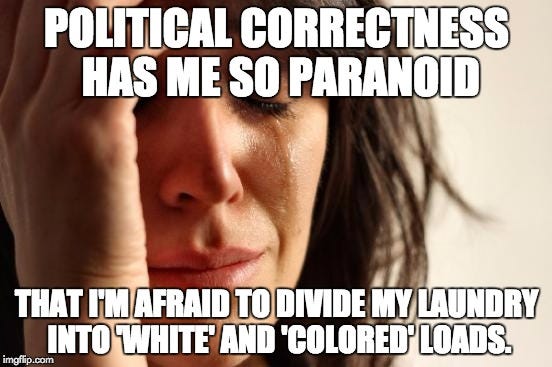
In this scenario I can see an argument that the toxic maximalists cared so much about Bitcoin that they thought the blacklist naming issue was a waste of developer resources. Was their deep concern misplaced? Yes. Was it unhealthy? You bet. What the toxic folks don't seem to realize is that this is an open project without leaders; no one has the authority to decide what is important and how other contributors should spend their time.
2/ This is a net negative for Bitcoin adoption. The "toxic maximalist" meme was a JOKE.
— Brad Mills (🔑,🧀) (@bradmillscan) March 4, 2020
You're not supposed to embrace it & actually become tactless individual, being rude for no reason.
Echo chamber of the "toxic maximalist" joke is actually making these ppl toxic. pic.twitter.com/KT8vVOdpJw
Remember when the toxic maximalist mob tried to cancel Lightning Labs because the WEF put them on their web site, despite Lightning Labs having nothing to do with them? This is a great example of how trigger-happy toxicity can actually be weaponized against Bitcoin if it’s so easy to sow discord.
they gave us some random award, literally unprompted, zero prior comms
— Olaoluwa Osuntokun (@roasbeef) February 19, 2022
no one at Lightning Labs works with, nor is affiliation with the WEF
after seeing all the uproar about this, seems all the WEF needs to do in order to sow discord in the community update their website?
Remember when the most tenured and well-respected Bitcoin educator was “canceled” for being interested in smart contracts? Andreas received enough backlash for writing Mastering Ethereum that he felt the need to explain himself in this video.
“If you think that I'm going to be "faithful" to Bitcoin by limiting my intellectual curiosity, by refusing to read or learn about technologies that may threaten the supremacy of the "one true doctrine" - that's not science, that's religion, and I don't do religion. That's a litmus test, a loyalty test, a purity test, and I don't do any of that. I'm going to remain intellectually curious.” - Andreas Antonopoulos
Beware of Bitcoin Echo Chambers
It’s hard to find a better example to illustrate the monoculture phenomenon of which I’ve written than this excerpt from the Bitcoin 2022 Conference in Miami. This conference is described (in their FAQ) as a “Bitcoin only” event.

However, it’s a mistake to assume that the majority of Bitcoiners are the same as you, even those attending a Bitcoin-only event! As we see here:
Consider Monetary Maximalism
In 2020 I wrote about “Shitcoins and STOs” to clarify my position on tokenized registered securities and I think I was the first to use the term “Bitcoin Monetary Maximalist” when describing my views. In retrospect, I believe I was attempting to convey a view that is sometimes known as “shitcoin minimalism.” That is to say, an acceptance that there is utility provided by some non-Bitcoin protocols even if they don’t have the same attributes or robustness as Bitcoin. Point being, you can be a Bitcoin maximalist who considers it to be the best form of money by far, while still finding value in protocols that offer utility other than “sound money.”
I think there’s a fundamental disconnect between the early rejection of premines versus distribution of shares in a security. There is a major difference between creating and printing your own money versus creating and issuing shares in a company. Now, to be fair, there are plenty of examples of organizations that have blurred the lines between these two activities. But my point is that the latter model is completely valid and it is a fundamental building block of modern capitalism - the ability to invest in a common enterprise.
I believe that many maximalists are simply disinterested in non-monetary uses of cryptographic protocols and are more interested in distinguishing Bitcoin from the rest of the ecosystem. Or, if they are interested in non-monetary use of such protocols, they consider that utility to be completely separate from Bitcoin and not in competition with it. Money is not a good like consumption goods (meant to be consumed) or capital goods (meant to produce consumption goods). There’s no fundamental problem with wanting a wide variety of such goods to exist. More capital goods produce more consumption goods and having more consumption goods means overall more wealth.
The creation of new currency units does not lead to increased wealth. It is better to have a fixed number of currency units, as money merely serves as a means to facilitate trade for goods and capital. When a single currency is used, the pricing system for goods in different circumstances such as location, production stage, and availability can be used effectively. On the other hand, having two or more currencies would require pricing the goods in one currency, converting it to another currency, and then pricing the goods in the new currency. This could result in a situation where there are as many currencies as there are people, leading to a regressive barter system.
In this regard, having a single currency is optimal, as it strikes a balance between using a single currency for everyone and a barter system without any currency at all. The addition of new currency does not lead to increased wealth, as it merely transfers wealth from those who receive it later to those who receive it earlier or to the currency issuers. The term "bitcoin maximalism" is a descriptive rather than a prescriptive statement of facts. It simply refers to the refusal to transfer one's wealth to self-appointed currency issuers.
Unfortunately, this is what happens when a culture of virtue signaling and purity testing enters into a feedback loop…
It seems somewhere along the way a certain sect of Bitcoin Maximalism branched off and became not just "anti shitty money" but "anti all assets other than bitcoin."
— Jameson Lopp (@lopp) August 25, 2020
Remember what happens when you take such extremism to its absurd logical conclusion:
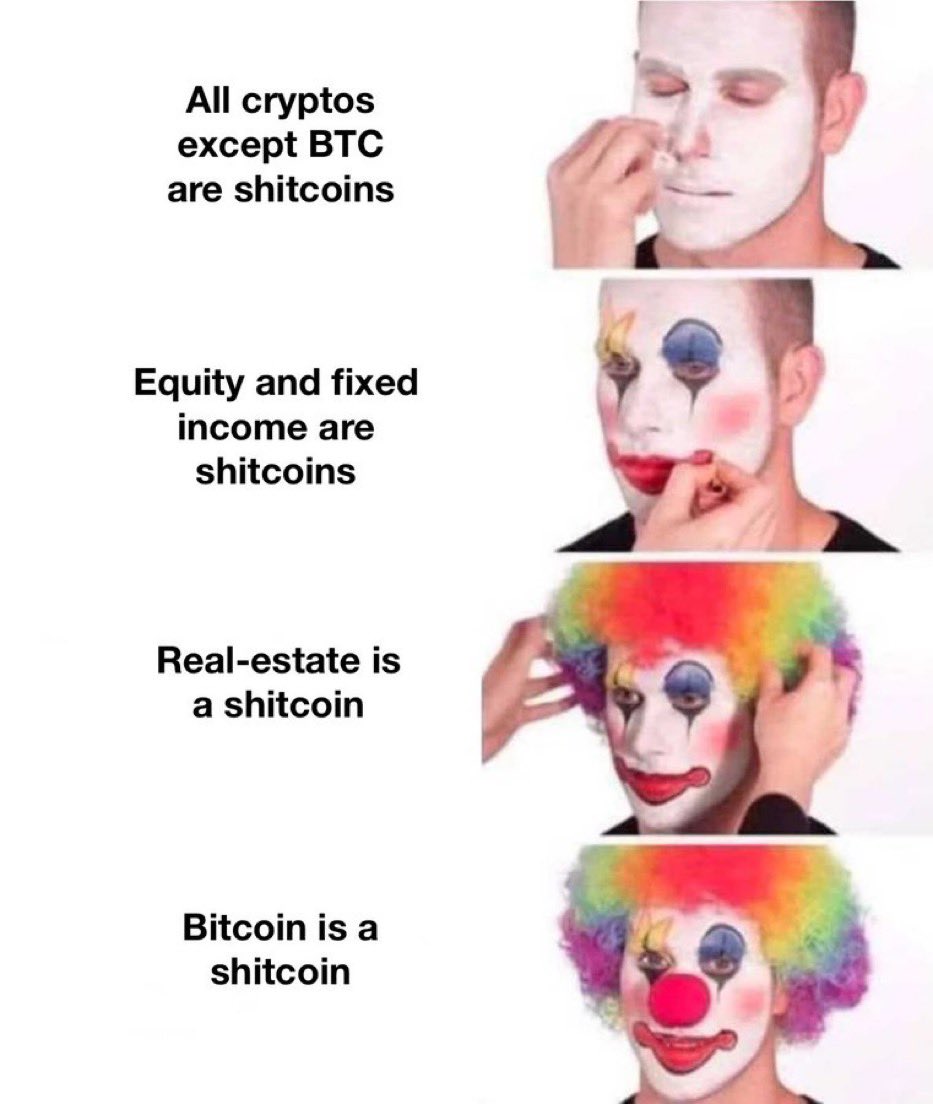
Maximalism’s Muddled Meaning
This entire article is a bit tongue in cheek given that the entire point is that there’s more to Bitcoin maximalism than the stereotypes.
"I can't believe you said _____, I thought maxis don't believe that!"
— Jameson Lopp (@lopp) October 25, 2021
The maximalism moniker is mostly meaningless at this point. Remember that it started off as a derogatory term and ended up being co-opted. There's no clear definition for it other than self identifying as one.
Remember how we came to be here today.
- In the beginning, there was only Bitcoin.
- Many cheap copycat scams came along and were dubbed “shitcoins.”
- Folks who wanted to drastically change Bitcoin but had their ideas rejected, developed the pejorative term of “maximalists” to describe conservative-minded Bitcoiners.
- This sparked tribalism between bitcoiners and multicoiners.
- Maximalists embraced the term as a counterculture movement.
- Over the years this culture evolved and strengthened during scaling debates.
- Some folks accelerated extremism after fork contention died down, amplified by various pandemic factors.
- The negativity was sufficiently annoying that it spawned a counter culture “anti maximalist” movement of its own among some bitcoiners.
- Now we live in an era of “no true bitcoiner” due to competition amongst virtue signalers.
Bitcoin is inherently counterculture. It is an adversarial environment. We should not expect that everyone will get along. Bitcoin is for enemies.
Bitcoin maximalism itself is neither good nor bad; it was born as a rational pushback to flawed narratives used to perpetuate scams and poorly architected projects. What we’ve witnessed over the past decade is an evolution and fracturing of folks who hold maximalist views. Some have chosen more nuanced paths while others have remained absolutists.
But I dare say that few folks fundamentally object to any particular set of maximalist views as long as the person espousing them is rational and polite. Pretty much all of the drama is a result of reactions to behavior and how folks are choosing to spread or defend their views. From that perspective it’s purely politics, psychology, and sociology - fairly uninteresting phenomena for a technologist such as myself.
As I’ve explained, I believe that a bit of toxicity is sometimes warranted in defense of Bitcoin. I certainly used such tactics myself during the scaling debates. What’s more controversial is the use of this communication style in a more offensive and aggressive manner.
If a goal of toxic maximalism is to increase the adoption of Bitcoin, I don’t find it to be a great strategy. Toxic maximalism doesn't scale because it regularly fractures its own community via more and more stringent purity tests. The phenomenon is actually somewhat similar to the fracturing that we observed among the “on-chain maximalists” AKA the “big blockers” - many of them forked to BCH and then an even smaller subset forked to BSV, creating ever-smaller networks and echo chambers with less and less value.
Bitcoin maximalism is neither dead nor is it dying. It is alive and well, though perhaps it’s suffering from an identity crisis as a result of some folks trying to make it a more exclusive subculture.
The sooner you realize that even self proclaimed Bitcoin maximalists don't agree about who is a maximalist, the sooner you'll realize the absurdity and futility of complaining about behavior you ascribe to maximalists.
— Jameson Lopp (@lopp) December 30, 2021
Where Do We Go From Here?
This is clearly a complex issue of culture and social dynamics. I’m no expert on either, but a few principles come to mind.
- Assume argument opponents operate in good faith until proven otherwise.
- Be the change you wish to see in the world.
- Treat others as you wish to be treated.
- Do not allow yourself to be silenced.
- Don’t feed the trolls.
- Live and let live.
My personal Twitter strategy:
follow foxy folks
— Jameson Lopp (@lopp) December 19, 2019
mute the morons
block the bastards
Bitcoin maximalism could benefit from a rebranding. The challenge with that is twofold:
- Folks who hate Bitcoin (nocoiners and altcoin maximalists) are incentivized to amplify the narrative that Bitcoiners are unhinged lunatics.
- The fringe group of toxic folks are willing to dedicate far more of their time perpetuating the stereotype than moderate or apathetic Bitcoiners are willing to fight it.
The vast majority of maximalists I know are confident in their thesis that Bitcoin shall prevail and see no need for constant criticism of competing projects. The tiny minority of folks who are loudly vitriolic on social media have managed to make themselves a laughingstock while crafting a stereotype that does not fit the vast majority of Bitcoiners. While we can’t stop the negativity and elitism perpetuated by people who believe they are defending Bitcoin on social media, we can reject it and refuse to engage with such activity.
I think it’s a mistake to allow toxic folks to set the narrative uncontested. Personally, I’ve already started referring to the toxic maximalists as Bitcoin Puritans because I think it’s a more precise description. [Brace yourselves, the Bitcoin Puritan memes are coming!] While all maximalists agree that Bitcoin is the best form of money and they want to see it continue to succeed, it’s the Bitcoin Puritans who feel the need to go the extra mile to reject anything that isn’t Bitcoin, apply arbitrary purity tests to group Bitcoin users into “insiders” and “outsiders,” and chastise those who dare show interest in non-Bitcoin projects.
After reading this tome, do you consider yourself to be a Bitcoin maximalist? If so, don’t hesitate to self-identify as such! And if someone tries to gatekeep the meaning of maximalism with purity tests in order to reject your claim of being a maximalist, feel free to laugh at their authoritarianism! When this topic of what constitutes “a real maximalist” inevitably comes up countless times in the future, I’ll simply link folks to this essay. You’re welcome to do the same!
Level-headed confidence and criticism beats blind cult-like rage. I believe a lot of the “extremely online grievance merchants” could benefit from a solid dose of stoicism. This line from A Cypherpunk’s Manifesto feels appropriate:
"We the Cypherpunks seek your questions and your concerns and hope we may engage you so that we do not deceive ourselves. We will not, however, be moved out of our course because some may disagree with our goals."
By no means do I expect the folks whose behavior I find objectionable to read this essay and change their ways. I just want to make my perspective on this situation clear - and in so doing, hopefully achieve a measure of consensus that I am far from alone in this perspective. I harbor no hatred or ill will against toxic Bitcoiners, as I know that they believe they are providing an important function in guiding the narratives for Bitcoin adoption. If anything, my feelings toward toxic folks is one of pity - it’s a shame to see anyone spending a substantial portion of their life spreading negativity and engaging in shallow bickering devoid of substance.
Those of you who spend an inordinate amount of your time posting on social media should ask yourself:
- Are you going to regurgitate memes or will you put in the intellectually rigorous work to defend them?
- Do you want to create drama or do you want to create value?
- Are you contributing signal or are you creating noise?
- Are your arguments emotional or logical?
If you’re upset that people are using protocols other than Bitcoin, you won’t help Bitcoin by jeering at them. It’s better to channel that rage into something productive; try talking less and building more.
“We are so focused on setting up the circular firing squad that we've forgotten who the real enemy is. The real enemy is totalitarianism, fascism, corrupt crony capitalism, and destructive banking systems that are absolutely centralized, share none of our values, and are causing enormous damage to the world.”
- Andreas Antonopoulos
P.S.
If you disagree with the content of this article, feel free to publish your own perspective. This is A History, not The History of Bitcoin Maximalism - I have no more authority than anyone else to opine upon this topic. I wouldn’t advise trying to cancel me; it didn’t work the first dozen times and it won’t work this time. Bitcoin is a battleground of ideas; in order to continue moving forward we must have healthy discourse. Show us what you’ve got!
I’m a Bitcoin maximalist (regardless of your opinion) who wants to see the world rebuilt to operate on a Bitcoin standard, and there’s nothing anyone can do to take that away from me. Cypherpunks do not ask for permission, nor do they seek approval.
I'm regularly called a bitcoin maximalist by altcoiners and am called a shitcoiner by bitcoiners.
— Jameson Lopp (@lopp) September 12, 2022
This amuses me to no end.

